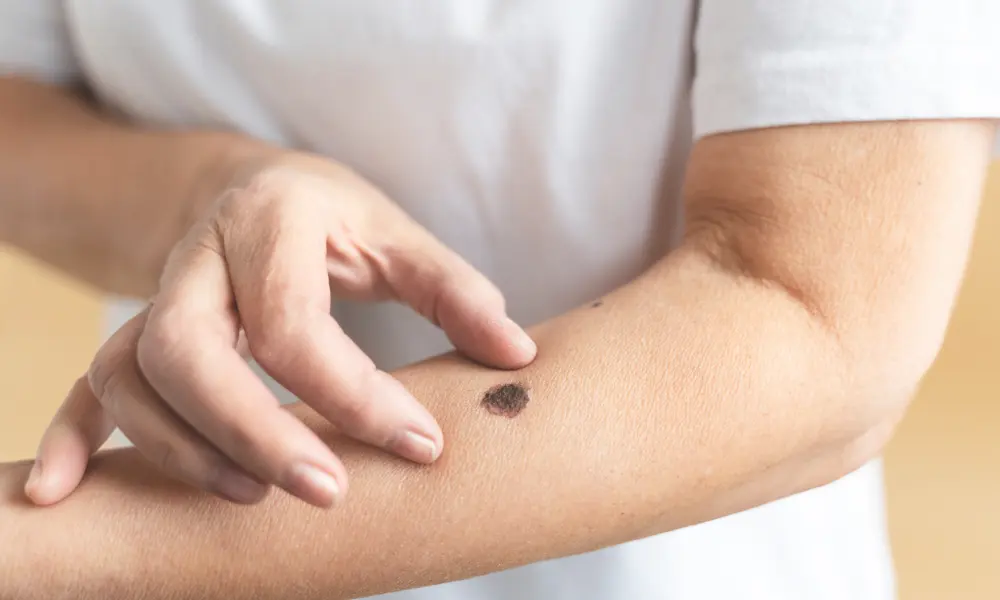What Causes Warts? Types, Symptoms, and Effective Treatments

TABLE OF CONTENTS
Warts show up as small, harmless growths on your skin & can feel rough or smooth based on their type. These lumps form because the human papillomavirus (HPV) infects the skin's top layer and makes cells grow extra fast. This article explains what warts are, their causes, and different treatment options.
Causes of Warts
The human papillomavirus stands alone as the cause of all warts. Scientists have found over 150 types of HPV strains, and each type leads to specific kinds of warts. The virus sneaks in through tiny skin breaks, which explains why children get warts more often due to their frequent scrapes and cuts.
These groups have a higher chance of getting warts:
People with weakened immune systems
Children and teenagers who use communal showers
People who have family members with warts
Those who handle raw meat often
People who have skin conditions like eczema
Warts might seem hard to get rid of, but most HPV infections clear up naturally within 1-2 years. Research with school-aged children showed that half of them no longer had warts after one year.
How Warts Spread
You can catch warts in three ways:
Touching someone's skin who has warts
Spreading them on yourself by touching your wart and then another body part
Using items that touched warts like towels, razors, or walking on wet floors near pools and showers
Research shows that two-thirds of people who touch infected skin end up with warts. The virus takes its time—you might not see any growth for weeks or months after exposure.
Types of Warts
Common warts: These usually appear on fingers, hands, or elbows as rough, round bumps with tiny black dots from blood vessels.
Plantar warts: Your feet's soles might get plantar warts that hurt to walk on.
Flat warts: These often appear on faces and legs. Flat warts appear as smaller, smoother bumps.
Genital warts: These appear as soft flesh-colored bumps in the genital and anal area. Sexual contact spreads genital warts to the private areas.
Symptoms and Identification

Each wart looks different. Some rise like domes, others stay flat. You might see rough patches or cauliflower shapes, even thread-like growths. The colour ranges from your natural skin tone to grey, brown, or black. Most warts don't bug you, but some itch, burn, bleed, or hurt - plantar warts give the most trouble.
Diagnosis of Warts
Doctors can identify warts by their unique appearance. Sometimes, with the help of a magnifying glass they get a closer look at suspicious spots on your skin. Sometimes doctors will gently scrape the growth's top layer to check for tiny black dots. These dots are actually small, clotted blood vessels that show up in common warts.
Your doctor might need a skin biopsy when warts look unusual or won't go away. This simple procedure takes a small piece of the suspected wart to the lab to:
Check if it's really a wart
Rule out other skin issues like calluses, corns, or skin cancer
Find the specific HPV strain behind the wart
A dermatoscope helps doctors see the wart's surface pattern and blood vessels clearly. This special magnifying tool comes with a light that boosts visibility. Doctors also use an acetic acid solution that turns warts white to help with diagnosis.
The doctor will consider your age, immune status, the wart's location, and past treatments before suggesting the best removal methods or treatment options.
Treatment Options for Warts
Your body often beats warts on its own, though it might take two years. Treatment options are:
Topical Treatments: Creams, gels, or solutions containing salicylic acid
Cryotherapy: Doctors use liquid nitrogen to freeze and destroy the wart tissue.
Laser Therapy: The laser shrinks and destroys the wart tissue.
Electrosurgery and Curettage: The surgeon uses electric current to burn the wart, and then they scrape it off.
Immunotherapy: With the help of this treatment the defence system of your body starts combating the HPV virus (responsible for your warts).
Surgery: In cases of large or painful warts, doctors might perform a small operation to remove the whole wart under local anaesthesia.
Preventing Warts from Spreading
You cannot completely prevent warts but you can lower your risk by doing this:
Don't touch other people's warts and wash your hands after treating your own
Cover cuts and scrapes right away because HPV enters through broken skin
Use your personal items only—never share towels, washcloths, razors, or nail clippers
Keep your skin moisturised to stop cracks that let the virus in
Wear flip-flops or shoes in public showers, pools, and locker rooms
Don't bite nails or pick at cuticles
Ask your doctor about the HPV vaccine to prevent genital warts
Complications Associated with Warts
These growths rarely cause serious trouble. Still, you might face some issues:
Foot pain from plantar warts
Spread to other spots
Feeling self-conscious about their appearance
Getting an infection if you pick at them
When to See a Doctor
Contact your doctor if your wart:
Is painful
Multiply faster than usual
Show up on your face or private parts
Bleed easily
Look different
Not improved with home treatments
If you have diabetes or a weak immune system
Conclusion
Knowing how warts work helps us tackle these bothersome skin growths better. These bumps rarely cause serious health issues for most people. HPV triggers their growth, and they can spread through skin contact or shared items like towels. Your body usually fights off the virus on its own. Most warts go away without treatment in a year or two. You can try over-the-counter treatments like salicylic acid if they persist. Your doctor might suggest freezing, laser therapy, or other medical procedures.
Warts are very common, though they might make you feel self-conscious (especially on visible areas like your face or hands). Most people deal with them sometime in their lives. You should see a doctor if warts hurt, look different, spread quickly or show up in sensitive areas like your face or genitals.
Now that you know more about these common skin growths you can take steps to prevent their spread & get the right treatment. Your skin needs proper care to stay healthy.
FAQs
What causes warts to develop?
The human papillomavirus (HPV) causes warts. Scientists have identified more than 100 types of HPV and each strain creates different kinds of warts. The virus sneaks in through small breaks in your skin, which makes cells grow faster than normal.
Are warts contagious?
Yes! Skin contact spreads warts easily. You can catch the virus by touching someone's wart. Most people come in contact with HPV at some point, but not everyone gets warts because each person's immune system reacts differently to the infection.
How do warts spread from person to person?
The virus spreads through:
Direct skin-to-skin contact
Shared items like towels or razors
Contact with contaminated surfaces (pools, showers)
Walking barefoot in public areas
Can warts go away on their own?
In fact, the majority of warts disappear naturally within two years. All the same, you might spread the virus to others while waiting.
What are the different types of warts?
Common warts show up on hands, plantar warts appear on feet, flat warts emerge on faces and limbs, filiform warts develop around eyes and mouth, and genital warts occur in intimate areas.
How can I tell if a lump is a wart or something else?
Most warts look like rough, flesh-coloured bumps. They differ from moles, which are brown, as warts stay colourless. The texture feels hard and scaly underneath, and you might notice tiny black dots (blood vessels).
What treatments are available for warts?
Doctors can treat warts with salicylic acid, cryotherapy (freezing), electrosurgery, laser therapy, immunotherapy, or surgical removal.
Can warts be prevented? If so, how?
Smart habits keep warts away.
Don't touch them directly.
Wash your hands after any contact.
Keep shoes on in locker rooms and pool areas.
Your personal items like towels and razors should stay just that - personal.
Are there any risks or complications associated with warts?
Most warts go away without serious problems, but some complications can occur:
You might need antibiotics if infections develop from picking or cutting warts
Plantar warts that grow inward can make walking painful
Visible warts can affect your self-esteem and mental health
Touching or scratching warts can spread them to other body parts
When should I see a doctor about a wart?
You should get medical help if:
Your home treatments haven't worked after several weeks
Your wart hurts, itches, burns, or bleeds
You have warts on your face, genitals, or mouth
Multiple warts develop at the same time
The growth changes how it looks or seems suspicious
You have diabetes or a weakened immune system






